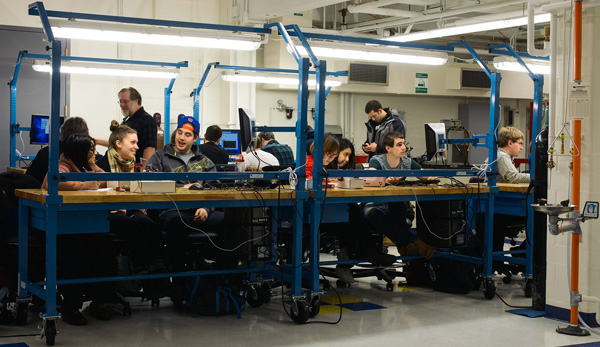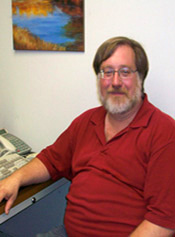News & Events
Doug Kelley named Engineering Professor of the Year by Student Association

(Associate Professor F. Douglas Kelley, behind students at left, in ChemE's newly refurbished undergrad lab. Photo by Brandon Vick.)
"As I look back on my undergraduate career, the person who has had one of the largest impacts on my time here is Professor Kelley. He is the true definition of an accessible professor . . . going above and beyond to help students flush out ideas for their senior design project or using his expertise to advise students on independent studies . . . Time and time again I have been amazed by his seemingly endless knowledge . . . and his knack for turning a simple question into a teaching moment that would open your eyes to another question or an idea you would have never considered."
That's high praise indeed, and typical of what several other students had to say when they nominated this year's recipient of the Student Association award for Engineering Professor of the Year.
 They are not alone in singing the praises of F. Douglas Kelley, Associate Professor of Chemical Engineering.
They are not alone in singing the praises of F. Douglas Kelley, Associate Professor of Chemical Engineering.
"In his relatively short time here, Doug has made a tremendous impact in our undergraduate program," says Department Chair Matthew Yates. "He is an outstanding teacher and well-deserving of the award."
Kelley, who earned his PhD in Chemical Engineering from UR in 1991, is a former Eastman Kodak Co. engineer and group leader who joined the department in 2009.
He wears many hats for ChemE. A major reason he was hired was to oversee long overdue renovations to the undergraduate labs. With the physical renovations now mostly complete, he is working with fellow faculty to incorporate the labs' new equipment and capabilities into the curriculum. And he continues to sign off on "everything that needs to be ordered, fixed or repaired" for the labs.
He is faculty advisor for the student-run UR Biodiesel project.
And each year he teaches the whole gamut of declared ChemE majors. In fall, sophomores take his introductory course in Chemical Process Analysis and seniors get started on their senior design projects in his Processes Lab. In spring, juniors take his Principles Lab.
'I don't ever close my door'
A burgeoning engineering enrollment has dramatically increased the number of students taking his classes. Last fall, for example, 75 sophomores enrolled in his process analysis class, and 40 seniors in his processes lab.
Even so, "I don't ever close my door," Kelley says. "I like to have the interaction with the students. I think they benefit from that."
They should not expect easy answers from him, however. "Some students may get frustrated when they come in to ask me for answers," he acknowledges. "I usually start the conversation with 'Well, what do you think?'"
It's all part of the learning process, Kelley said. "As future engineers they have to move into a position where they're making their own decisions, and finding out where the theoretical stuff they learned in class starts to apply to real world problems."
For a lot of students, that happens in the labs. "A lot of the things they've learned in class don't sink in until they actually see it physically," Kelley said.
Students learn to work as a team
Juniors do their lab work in teams of three, Kelley explained, and they are allowed to choose their lab mates. Seniors work in teams of four. The members of those teams are carefully chosen by Kelley and other faculty members, who seek just the right balance of "book" and "hands-on" learners; they try to group together students whose academic strengths complement each other.
"At the end what we're trying to do is get a group of four people who bring in all the aspects you need. If that is in place, the team -- in theory -- has what it takes to be successful. What they have to learn is how to behave as a team."
Given the many hats that Kelley wears, it is not surprising that one of the student nominations described him as " the unsung hero of the department. We all talk about doing things to show him that we care, but I feel that he deserves for the entire university to hear about his leadership and impact."
And now it has.
